David Yambio speaks to InfoMigrants about living in Libya as a refugee and what motivated him to found Refugees in Libya and become a human rights activist.
Part One of David Yambio's story can be found here.
In Libya, David Yambio’s experiences became increasingly harrowing. Kidnapped by militias he believed to be affiliated with the Libyan Ministry of Interior, he says he endured torture, forced labor, and inhumane detention conditions.
Numerous reports from international organizations and journalists have demonstrated how detention centers in Libya, controlled by gangs and militias, exploit migrants for profit. The country's state of lawlessness fosters a climate of violence, where gangs abduct and detain migrants for ransom. Those unable to pay face torture or even execution. Many of these militias operate with the tacit approval of the Libyan Ministry of the Interior, he explains.
During his time in detention centers, Yambio witnessed unimaginable horrors: disease, violence, starvation, and death were daily occurrences. He was first detained and taken to the Tariq al-Sikka detention center, infamous for its brutal conditions and controlled by Mohammed Al-Khoja’s militia. Al-Khoja, a UN-sanctioned figure implicated in severe abuses against migrants, wields immense power as the head of Libya's Department for Combating Irregular Migration (DCIM). Under his leadership, the organization Amnesty International, among others, highlighted how the detention centers became synonymous with inhumane conditions, arbitrary detention, extortion, torture, sexual violence, and forced labor.
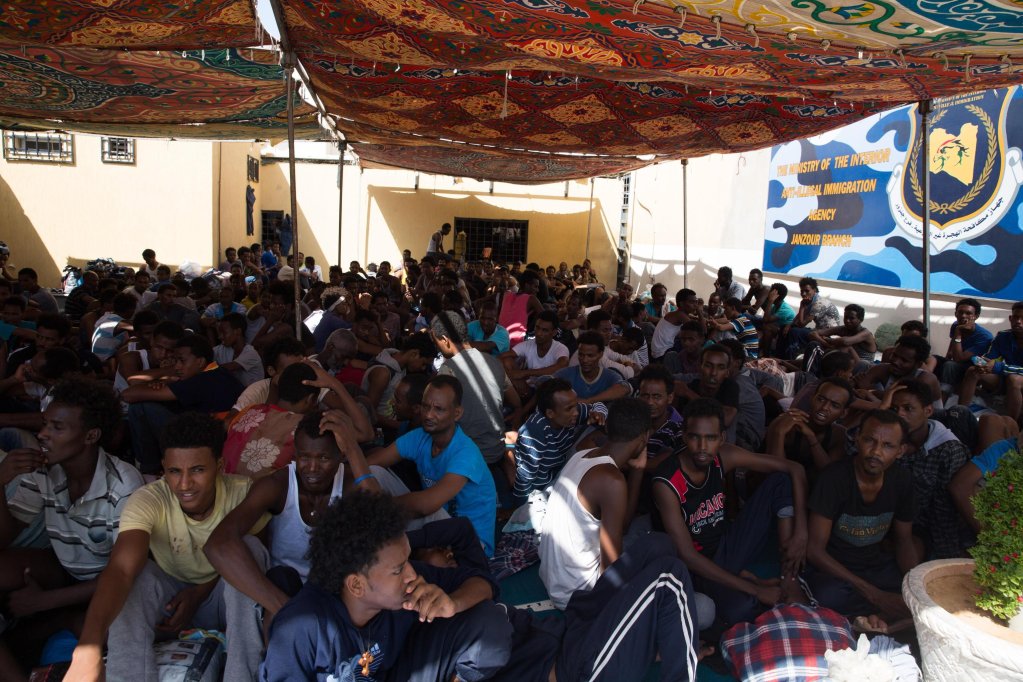
Al-Khoja himself has been linked to human trafficking networks, exploiting migrants for personal profit. Other detention centers, including Al Mabani (now closed) and Ain Zara, mirror Tariq al-Sikka’s brutality, with detainees suffering neglect, overcrowding, and systematic abuse. Some of these facilities receive funding from European authorities, who have faced growing criticism for tacitly enabling these atrocities through their cooperation with Libya.
Read AlsoHundreds of migrants detained in Libyan desert
The Libyan slave trade
Between 2018 and 2020, Yambio says he became a victim of Libya’s modern slave trade. He describes being "sold" repeatedly, using the term matter-of-factly, though this makes it no less chilling. After being moved from one prison, he was sold again to the RADA Special Deterrence Forces, a radical Islamist military police unit in Tripoli, he says.
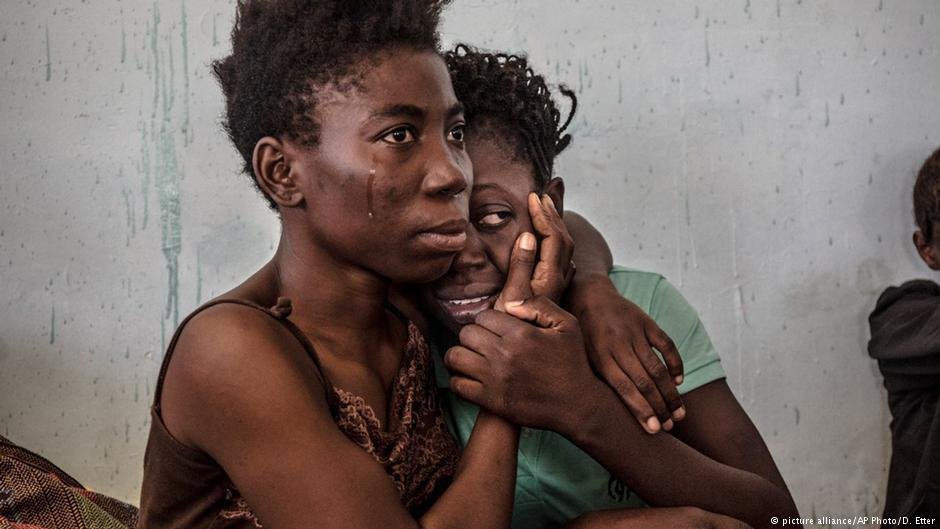
And once again he found himself being forced to fight alongside a brutal militia, this time in the Libyan civil war of 2019 that ended in around August 2020, until he finally managed to escape in late April, 2020. Now in Europe, he continues documenting these atrocities through social media:
"The slave trade is alive and thriving in Libya. It thrives in the silence of nations, in the shadows of complicit systems, and in the unchecked racism that dehumanizes Black lives," he writes in a recent post which includes photos of a woman who was gagged and bound in a cell.
These stories, Yambio writes, are not an anomaly, but "the legacy of a history that refuses to end."
These images are usually taken by the militias themselves to extort money from the victim's family, he explains.
Read AlsoThe cruel reality of migrant detention and deportation in Libya
Founding 'Refugees in Libya'
Desperate to flee Libya, Yambio attempted to cross the Mediterranean several times, but these boats were intercepted and returned to Libyan shores. In between attempts, he became active on the ground, "I started to understand Libyan civil society and began volunteering with entities like UNHCR and MSF, trying to help the migrant and refugee community."
In October 2021, this experience proved invaluable. Following a violent raid in Tripoli's Gargaresh neighborhood – home to thousands of migrants, over 5,000 refugees were arbitrarily arrested. Those who escaped detention sought refuge at the UNHCR headquarters, only to be informed that the organization's limited mandate in Libya meant they could not provide shelter.
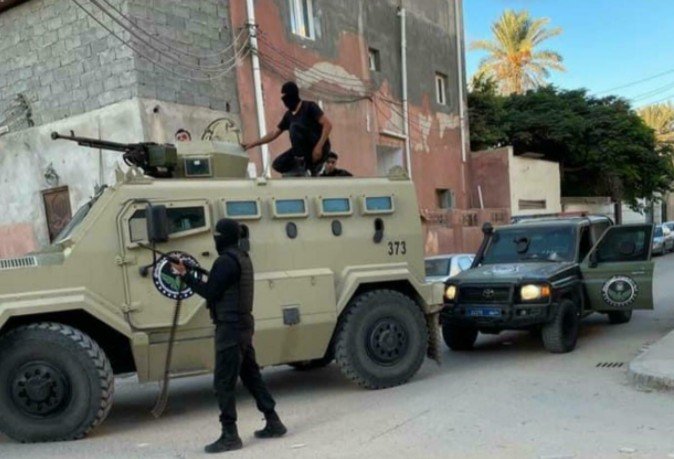
In response, Yambio helped form "Refugees in Libya," a group of 4,000 refugees from 11 nationalities. They united, they say, to give a collective voice to their struggles, organizing protests and forming committees for communication, medical care, and advocacy. Despite facing challenges like language barriers and trauma, the group persisted.
Blocked by local and international media, the refugees turned to social media to amplify their voices.
"At this point, we had to use what was available at our disposal," Yambio explains. "We started to tweet, and we created our own assembly. That’s how we became 'Refugees in Libya'."
Their protests sought to highlight refugee mistreatment and the limited evacuation options for certain nationalities. Inspired by earlier protests, such as those by Tajura bombing survivors, they sought to create a unified entity representing all refugees. Their efforts gained international recognition, with letters sent to the European Parliament, the African Union, and even Pope Francis.
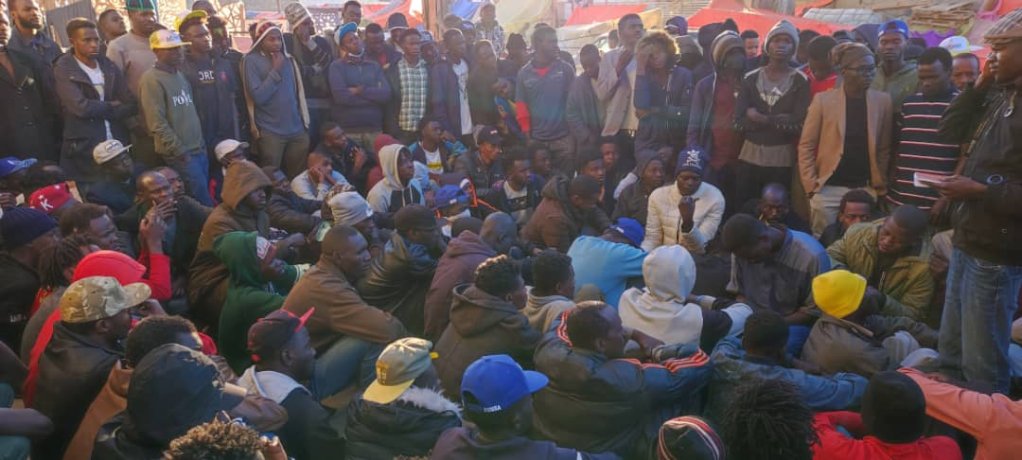
"We knew we needed to do it differently," he reflects. "We were able to sit and negotiate with the Libyan authorities, with the UNHCR and the locals. So through this, we also had a degree of international recognition from European civil society."
The protest went on for three months and 10 days with protesters camping on the streets. Many faced attacks, while others succumbed to severe health issues, recalls Yambio.
"It was very harsh. A lot of people died. Some were shot at, some were hit by a car. Some died because of medical neglect, some because of starvation."
Read AlsoUNHCR scales up response to Sudanese refugees coming to Libya
'On the run'
On January 10, 2022, the protest was violently shut down by militias, reportedly acting on the orders of Al-Khoja and the Interior Ministry, according to several migrant rights organizations. Over 700 people were subsequently detained at the Ain Zara detention center.
As a key organizer, Yambio became a target. His personal information was made public, and he was labeled a "wanted criminal" by Libyan authorities. Fearing for his life, he went into hiding. He tried to seek refuge through various humanitarian channels, including the Italian and German governments, but faced repeated rejections.
With no other options, he says, he boarded a small boat in June 2022 in a bid to flee Libya once again. However this time he made it, arriving in Sicily later that month.
Read AlsoLibya's coast guard has intercepted and returned nearly 21,000 migrants in 2024
Activism and advocacy
In recent years, Yambio’s focus has shifted toward activism. Through his organization, "Refugees in Libya," he documents alleged atrocities, advocates for refugee rights, and provides support for those still trapped in Libya’s system of exploitation.
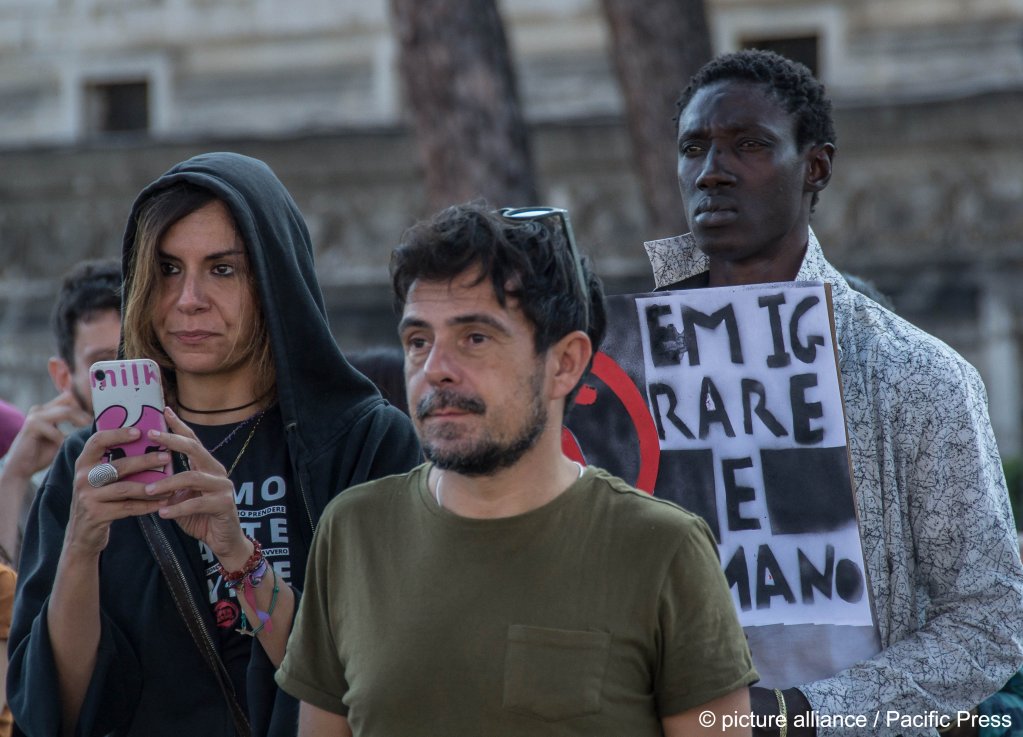
In July 2024, Yambio officially established "Refugees in Libya" as a registered NGO. The organization provides hotlines, medical care, and psychological rehabilitation for refugees in Libya and Tunisia. It also engages in strategic litigation, partnering with the European Center for Constitutional and Human Rights to hold European actors accountable for their role in the crisis.
In December last year, Refugees in Libya started the "Human Rights Evacuation Defender Campaign" which seeks to address the immediate and long-term challenges faced by migrants in Libya. Initially focusing on advocating for the release and relocation of 250 individuals detained after the protests in Tripoli, the campaign works to open pathways across Europe for their resettlement, bypassing the dangerous Mediterranean route.
"We are not advocating for more refugees to be created or for everyone to come to Europe, but these people are exceptions. They are stuck in a country they cannot go back home but they cannot stay, and they have to be brought to safety."
He also seeks to help people who are in Libya and do not want to cross the sea, who need food, shelter and access to medication. "Refugees cannot just walk into a hospital and get treated. So when we have a bigger budget, we would like to compensate for these gaps," he says.
Beyond relocation and support in Libya, the campaign emphasizes the need for peacebuilding in migrants' countries of origin, addressing the root causes of forced migration.
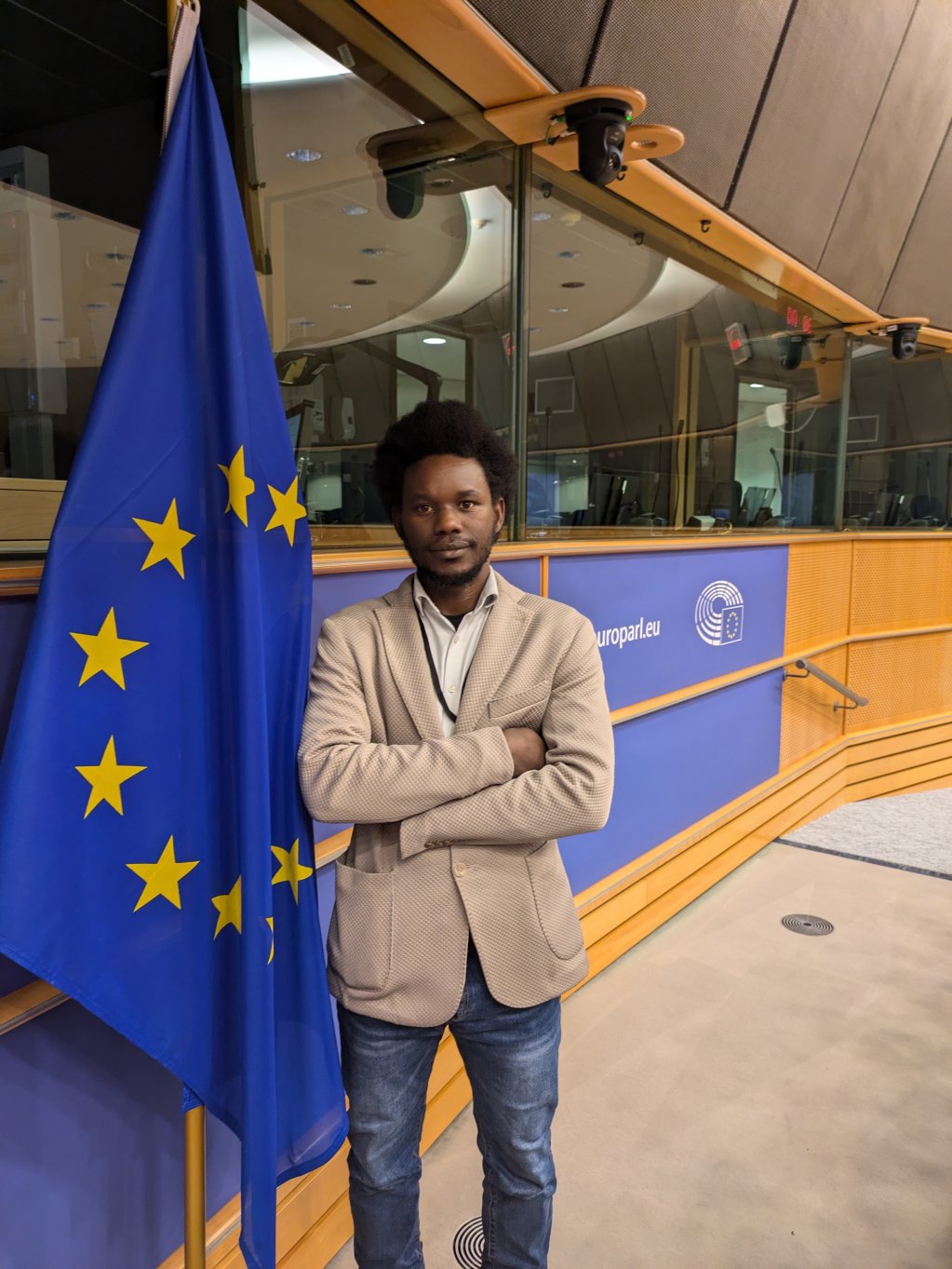
Now living in Italy, his work has drawn international recognition, also shining a light on the systemic injustices refugees face once they reach a safe country.
"The struggle doesn’t end when you find yourself here. You have a job, a house…or access to education. That’s not the end of the struggle."
Reflecting on his experiences, he highlights the racism and abuse faced by Black Africans, both on the move and within Europe.
"We have to continue speaking about the injustices that have been inflicted on us since we were born and the ones that we have experienced in transit, which is a consequence of the countries that we are now living in."
Read Also'I can't imagine the future' – Ajabana, 'exhausted' after nine months of detention in Libya
The meaning of 'home'
Talking about his plans and his dreams he seems cautious, "I can never tell how big a future is," he says. "I think I’ve always lived in the present. That’s why I try to work hard to make the changes I want to see now."
While Yambio continues his work in Europe, his heart remains in South Sudan. He dreams of returning to rebuild his homeland and advocate for peace and collective healing.
"I want to return to be part of the process to…to say, okay, we can heal from all this trauma. We can build a country."
"I want access to humanity, to a community of people, that dream of peace, that dream of being equal in some way," he says.
He emphasizes that security in his home country is crucial to put an end to the dangers faced by so many people on the move. "One day, in 20 years or 10 years from now, it will be a big dream to focus on myself and be able to go and reconstruct our homes, which will then put an end to people coming to Libya, because younger generations coming to Libya with the hope of crossing the Mediterranean is not a thing I wish for my brother, for my child."
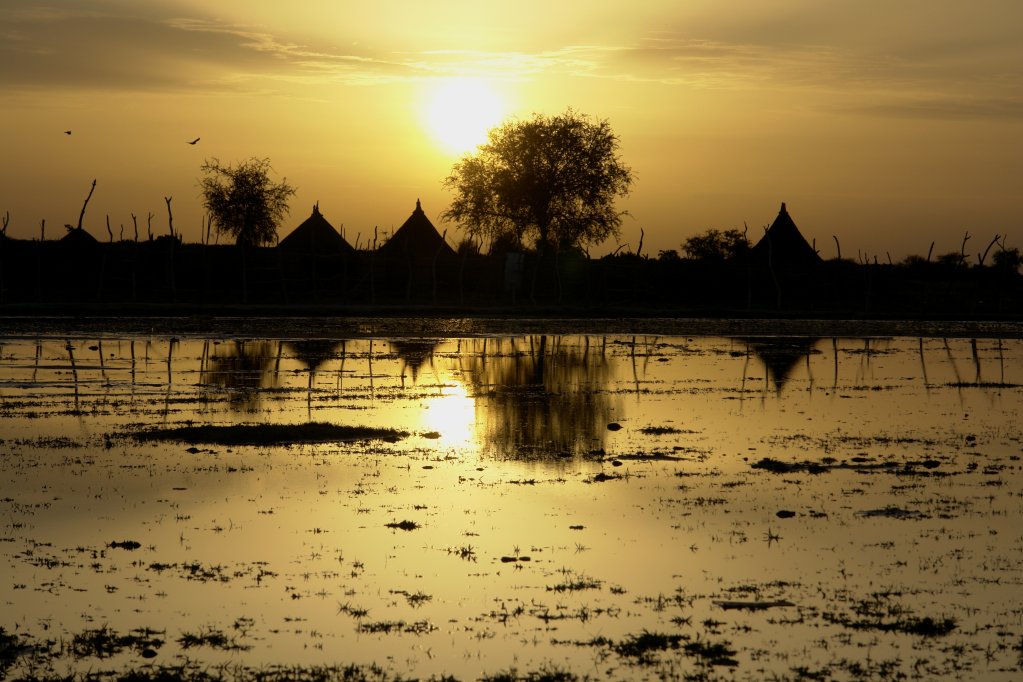
Perhaps that concept of home is even more important to Yambio because he acknowledges the challenges of feeling at home as a refugee.
"There’s a pure sense of home that will never exist. Walking the streets here, you feel invisible, defined by the label of immigrant or refugee – which follows you like a curse."
Yambio explains that a sense of belonging when you are fleeing violence can be especially difficult. "The fact that I had to go away in order to feel safe in another place against my will, already robs me of feeling at home anywhere," he says.
"Because to feel at home, I have to really go to where I belong."
Read Also'Sudan is trapped in a nightmare' – extreme violence drives record refugee exodus, UN says
